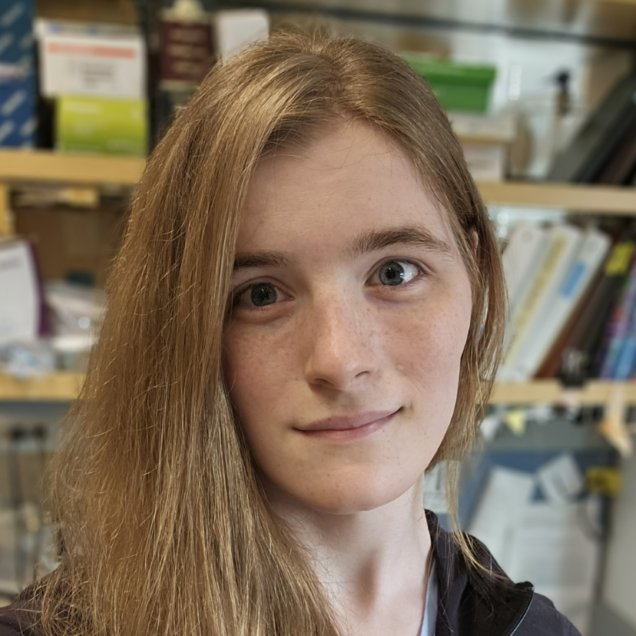The awardees and honorable mentions for the 2024 NSF Graduate Research Fellowship Program (GRFP) competition were recently posted and several Biology students were recognized. MCBB PhD student Kristen Harder of the McCall Lab, Biology PhD student Dylan Mankel of the Marlow Lab, and Biology PhD student Elif Ozsen of the Chantranupong Lab were awarded with 3-year graduate research fellowships. Biology PhD students Catherine Gill of the Gilmore Lab and Victoria Guarino and Yu (Emily) Yang of the Wunderlich Lab received honorable mentions.
 Kristen’s research focuses on regulated cell death, a necessary process involved in development and disease. Using Drosophilaas a model organism, they will investigate phagocytic cell death in the brain. Phagocytosis involves a variety of “find me” and “eat-me” signals, proteins, and receptors, and Kristen aims to understand the mechanism of these various molecules and genes. In the brain, phagocytosis occurs when glial cells engulf dendritic spines and synapses during synaptic pruning. Understanding this mechanism will uncover more about neurological disease. Kristen’s research focuses on regulated cell death, a necessary process involved in development and disease. Using Drosophilaas a model organism, they will investigate phagocytic cell death in the brain. Phagocytosis involves a variety of “find me” and “eat-me” signals, proteins, and receptors, and Kristen aims to understand the mechanism of these various molecules and genes. In the brain, phagocytosis occurs when glial cells engulf dendritic spines and synapses during synaptic pruning. Understanding this mechanism will uncover more about neurological disease. |
 Dylan specializes in understanding microbial life within its physical, geochemical, and mineralogical context. His work focuses on extreme environments, places that are analogous to conditions on Mars and ocean worlds and resemble some of the earliest habitats here on Earth. By extension, the microorganisms living there provide a unique window into the physical and metabolic limits of life, and how life may have evolved and what it might look like today in these far-off places. Dylan specializes in understanding microbial life within its physical, geochemical, and mineralogical context. His work focuses on extreme environments, places that are analogous to conditions on Mars and ocean worlds and resemble some of the earliest habitats here on Earth. By extension, the microorganisms living there provide a unique window into the physical and metabolic limits of life, and how life may have evolved and what it might look like today in these far-off places.Now supported by the NSF GRFP, he will continue his work on chimneys collected from some of the deepest and hottest hydrothermal systems currently known. He will be utilizing modern sequencing and microscopy approaches in order to derive the fundamental rules governing microbial community structure, activity, and biogeochemical impacts within these unique rock substrates.
|
 Elif drew inspiration from her previous work at Rutgers University on neuronal microtubules. She proposed to elucidate the mechanisms by which microglia—the immune cells of the brain—alter their shape upon activation. To define this process, she focused on Golgi outposts—satellite organelles that are critical for microtubule organization and driving changes in cellular morphology, but whose function in microglia remains unknown. Elif drew inspiration from her previous work at Rutgers University on neuronal microtubules. She proposed to elucidate the mechanisms by which microglia—the immune cells of the brain—alter their shape upon activation. To define this process, she focused on Golgi outposts—satellite organelles that are critical for microtubule organization and driving changes in cellular morphology, but whose function in microglia remains unknown. As a graduate student, Elif will build upon her interest in neuronal cell biology to study how signaling pathways and organelles are remodeled across the unique cellular architecture of neurons. She will focus on nutrient sensing, an evolutionarily conserved and lysosomal-dependent process that is poorly understood in the brain. She will develop high-resolution imaging methods to reveal the spatiotemporal dynamics of nutrient sensing and define how these dynamics are coupled to lysosomal state at a subcellular scale. Her work will advance our understanding of how neurons sense nutrients to maintain health and how this process goes awry in diseases such as neurodegeneration and epilepsy.
|
 Catherine is a first-year Cell & Molecular Biology PhD student in the Gilmore lab, which applies molecular, genetic, cellular and biochemical techniques to study a family of transcription factors called the Rel/NF-kB family. Catherine is a first-year Cell & Molecular Biology PhD student in the Gilmore lab, which applies molecular, genetic, cellular and biochemical techniques to study a family of transcription factors called the Rel/NF-kB family. |
 Victoria recently joined the Wunderlich Lab which investigates the tasks, architecture, robustness, and adaptability of gene regulatory networks (GRNs) using the Drosophila early embryonic patterning system. Victoria’s research project aims to further understand how shadow enhancers function by developing both synthetic transcription factors and enhancers to measure mRNA dynamics in transgenic flies. Her work will hopefully impact the fields of gene regulation, developmental biology, and human disease. Victoria recently joined the Wunderlich Lab which investigates the tasks, architecture, robustness, and adaptability of gene regulatory networks (GRNs) using the Drosophila early embryonic patterning system. Victoria’s research project aims to further understand how shadow enhancers function by developing both synthetic transcription factors and enhancers to measure mRNA dynamics in transgenic flies. Her work will hopefully impact the fields of gene regulation, developmental biology, and human disease. |
 Emily is studying non-genetic factors of immune activation using fruit flies. Immune activation is a tightly controlled process, as over-activation leads to autoimmunity, while under-activation lets bacteria proliferate unchecked. However, even genetically identical organisms react differently to an infection leading to survival or death. Using bioluminescent bacteria she can track infection progress within the fly. In addition, fluorescently tagging the host immune response will report back on the exact time of immune activation. These results generate a new visual tracking method for studying immunity. Emily is studying non-genetic factors of immune activation using fruit flies. Immune activation is a tightly controlled process, as over-activation leads to autoimmunity, while under-activation lets bacteria proliferate unchecked. However, even genetically identical organisms react differently to an infection leading to survival or death. Using bioluminescent bacteria she can track infection progress within the fly. In addition, fluorescently tagging the host immune response will report back on the exact time of immune activation. These results generate a new visual tracking method for studying immunity. |
Congratulations to the awardees and honorable mentions on your hard work and this well-deserved honor.